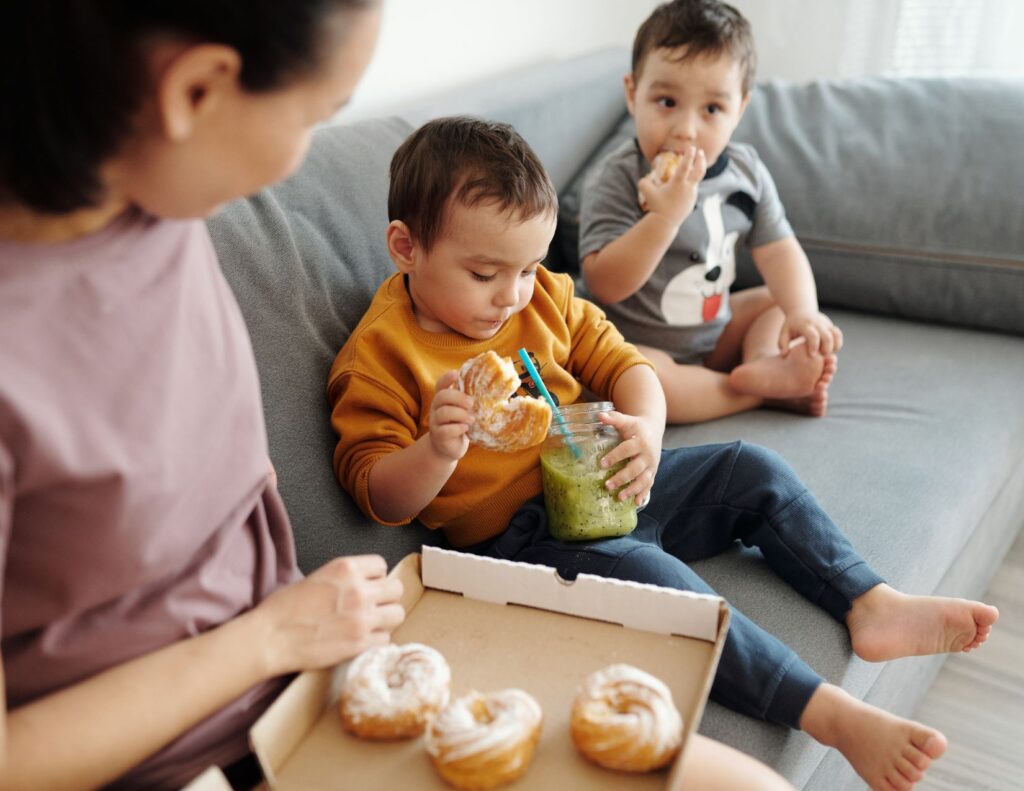If you have a learning eater (aka picky eater) at home, there’s likely been at least ONE time that you’ve found yourself in a situation where your kid won’t eat dinner then asks for a snack! They may even ask for a snack before the meal is over. Cue the facepalm emoji.
Why refusal of supper stings!
When kids refuse to eat their dinner, it stings more than any other food refusal. Oftentimes, this is because caregivers tend to put more time, energy and effort into making the supper meal. When high effort combines with fatigue after a long day of work, the “I’m not eating that” comment becomes very triggering!
Why the “post-supper” ask for snacks pushes our buttons!
One of the most common questions clients ask our dietitians is how to navigate the situation where a kid picks away at supper like a bird but then requests a hefty serving of ‘fun-snacky’ foods immediately or shortly thereafter.
Before we answer this question though, it’s so important to first understand WHY your kid won’t eat dinner! Let’s look at 10 reasons why your kid won’t eat their dinner.
10 Reasons Why Your Kid Won’t Eat Dinner
#1 They’re not physically hungry (3 reasons why).
As parents, we tend to have preconceived notions as to how much food our kids should eat before they’re full. However, the only person who truly knows how hungry or full they are, is our kiddo! It’s our job as parents to protect their innate hunger and fullness cues that they were born with, instead of interfering with them. We want to move away from GETTING them to eat to just LETTING them eat!
Let’s look at a few reasons why they might not be hungry at supper time:
No. 1. Grazing on snacks all day.
When kids eat all day long, they often aren’t interested in their meal at dinner because they’re just full enough from their last snack to take the edge off their hunger.
SOLUTION: Try to stick with a feeding schedule of set snack and mealtimes which allows for non-eating periods during the day where they can build their hunger. Don’t forget that it’s okay for kids to feel hunger. Not every request for food needs immediate action!
No. 2. After-school/daycare snack is too close to dinner.
The struggle is real with this one! Oftentimes kids come home from school and are HUNGRY! They eat a substantial snack around 4:00 pm and then are FULL as soon as supper is on the table!
SOLUTION: If you can, aim for a minimum of a 2 to 2.5 hour gap between after-school snack and supper. Alternatively, some families choose to skip after-school snack and eat an early supper between 4:00 and 5:00 pm. If you do that, be sure to offer a bedtime snack if there is a 2 hour gap between supper and bedtime.
No. 3. Drinking too much milk.
Although milk is nutrient dense and a great choice for kids, it is filling! Sipping on milk all day quickly kills a young child’s appetite for meals, very similar to grazing. As per the Canadian Pediatric Society guidelines, kids 1-2 years should aim for about 2 cups of milk daily (up to a maximum of 3 cups or 750 mL).
SOLUTION: Once your kiddo hits the 1 year mark, start to see milk as a FOOD and serve milk WITH meals and snacks at the table. Provide water otherwise when they’re thirsty outside of a meal/snack.

#2 There’s too much pressure.
Pressure to eat can come in direct forms (bite rules, rewards, bribes, punishments etc.) and indirect forms (micro-managing, excessive talk about food etc.) but it’s all pressure! Comments like “Just 3 more bites” or “Eat your chicken so your muscles get bigger!” make a child feel overwhelmed at the table. This in turn causes more anxiety. Research supports that anxiety in kids is an appetite thief. It’s hard to be hungry if you’re constantly being pressured to eat.
SOLUTION: Once the food is on the table for supper, remember that you’ve done your job of providing food, and now it’s your job to simply facilitate a pleasant eating experience. Try your best NOT to talk about food. Ask them who they played with at school or what they want to do this summer. Pretend they’re your best friend and talk to them the way you would to your friend. This will help you to build a sense of safety and security at the table, which is so important for your feeding relationship.
#3 There are no familiar (or safe) foods at the table.
Children who are learning eaters (picky eaters) often aren’t interested in eating anything at a meal if there are no foods on the table that they can recognize or have eaten in the past. Chances are, if they’ve never eaten curry or rice and those are the only two foods on the table, they won’t eat anything. Many selective eaters would choose hunger over eating something that looks foreign to them.
SOLUTION: Start to add 1 or 2 familiar foods (foods they’ve eaten in the past) to the table so that they have something to eat as you enjoy the main entree. This might look like adding naan bread and a bowl of fresh veggies and/or a glass of milk to the table. This is being considerate without catering.
#4 Supper portions are too big.
It’s easy and efficient to pre-plate dinner for everyone in the same portions. A scoop of potatoes, a potion of meat and a cup of veggies. While it’s easy, it’s not always helpful! Especially for younger kids or kids who are selective eaters. Big portions lead to overwhelm, with thoughts like “why bother trying – I’ll never be able to eat all of it anyways!”
SOLUTION: Try serving food family-style (in bowls or pots) on the table and letting everyone take an amount of food that feels good for them. Or, if you prefer to pre-plate food, start with a one teaspoon to one tablespoon of non-preferred foods on their plate. Be sure to remind them that “we all have a bit on our plates, but it’s up to you if you want to take a bite.”
#5 They’re testing what happens when they say “NO!”
This is very common in toddlers! They may be hungry but the food they put into their mouths may feel like the only place in their life where they are in control. So, they test the waters! If I refuse this food, will my mom or dad go and get me that yummy cookie?
SOLUTION: Don’t let their dinner refusals ruffle your feathers! As much as possible, stay calm, cool and collected. Acknowledge them without getting emotional (I realize this is easier said than done!). Stick with your scheduled snack and mealtimes.
#6 Fear of the unknown.
More highly selective eaters (commonly referred to as extremely picky eaters) can be quite anxious when they see, smell, touch or experience a non-preferred food or ‘new-to-them’ food. The fear of the unknown can be crippling. They’re not sure what the food will feel like or taste like in their mouth and so oftentimes choose to not eat it because that feels like the safer choice.
SOLUTION: Don’t pressure them! If your child is anxious or fearful around foods, this is reason to reach out for expert help. If anxiety at the table (and in other areas of life) has been an ongoing challenge, it may be beneficial to seek the guidance of a therapist alongside a dietitian.
#7 They’re distracted.
The supper hour can be a whirlwind for many families! Parents are rushing home from work and kids oftentimes are eating in shifts due to activities. You may be expecting your kid to sit and eat their dinner quietly while you rush around, but instead they can’t sit still. It’s easy to pull out a screen to encourage them to just sit and eat!
SOLUTION: We’re moms ourselves and completely understand that not every supper will be distraction-free. We’re also very aware that some children, due to specific challenges, do better with a screen at the table while they eat. However, if your goal is to go screen-free, start by getting a bin and ask one child to collect all the portable devices prior to meal time – this includes your screens too mom and/or dad!
#8 They just haven’t seen what you’re serving enough yet.
Dinner foods are complicated. Oftentimes they are mixed (eg., casseroles, soups, salads etc.) and not as predictable as, say, a granola bar. If your child refuses a supper entree, it could be because they simply haven’t seen it enough and haven’t had the chance for it to become familiar to them.
SOLUTION: Give it time! Keep serving it with some consistency (at least a few times a month) so that they can continue to see it and get familiar with it. Research supports that children need numerous exposures (up to 15 or more) to a food before they feel comfortable trying it. You can provide more opportunities for exposure to foods that they don’t currently eat by inviting your child into the kitchen with you as you prepare dinner. This provides exposure and positive connections with you around food! Win-win!

#9 They’re exhausted.
Our tinniest humans (babies, toddlers and preschoolers) are often completely worn out by the supper hour! If their afternoon nap wasn’t stellar, it can make for a long and trying supper hour before bed!
SOLUTION: Remind yourself that kids eat throughout the course of a day. We’ve noticed that many younger kids have a tendency to front-load their energy intake, eating progressively less as the day goes on. Try not to worry too much if dinner isn’t a balanced meal. It can also be helpful to take a broader view of what your child eats over the period of 3 days vs. one singular meal.
#10 There is something else going on (medically).
Some kids really struggle to eat and it’s not because they’re trying to be difficult! Schedule a visit with your family doctor, pediatrician and/or dietitian to help discern any underlying medical causes of their food refusals. Some medical concerns we’ve seen from kiddos who refuse food include:
- Chronic constipation makes kids feel ‘full’ and not as interested in eating
- Undiagnosed food sensitivity or allergy or disease (e.g. celiac disease)
- Eating is hard due to an oral motor challenge (e.g. swallowing, chewing, gagging etc.)
- Underlying anxiety, depression or neurodiversity
While understanding the root cause of your child’s dinner refusal is important, it still doesn’t answer your question about what to do in the moment when they eat nothing and ask for a snack! Let’s continue!
Why kids prefer snacks over dinner
Many kids prefer snacks over supper foods because:
- Snacks are predictable (often the same foods are offered for snack)
- Snacks are singular foods (not many serve casserole or soup for snack!)
- Snacks are easier to eat (oftentimes uniform, self-serve foods)
- Snacks are marketed in fun ways to kids (I call this the ‘shiny package syndrome’)
- Many kids can choose their own snacks (but can’t choose their own dinner)

What to do if your kid won’t eat dinner than asks for a snack
Figure out what the root cause(s) are for the dinner refusal! (Hint! Scroll back up and check out the 10 reasons why they refuse dinner!). I cannot stress enough how important it is to know why supper refusal is happening. (P.S. 1:1 support with an expert dietitian in picky eating can make this easier for you!).
In the moment, you have a couple of options:
- Option 1: Lovingly hold the boundary. “That’s it for now darling. Bedtime snack is at 7:30. Do you want to help me get that ready when it’s time for that?”
- Option 2: Be flexible. “I noticed you didn’t eat anything at dinner. I also want to apologize that I forgot to include a couple safe foods that you like with the dinner menu. Are you hungry? Do you want to assemble a plate of food now? Remember, we aim for 3 or 4 different foods at a meal. I’m done cooking today but I can help you get something together.
The situation, your child’s age, their particular eating struggles or medical conditions, the severity of their selective eating, your family feeding environment and feeding goals will all affect which option you may use. Feeding kids is not black and white. What works for one family and child won’t work for another.
What about offering their cold plate of uneaten dinner for snack?
Is this an option? I suppose. In my years of working with selective eaters, I can distinctly remember one family (of hundreds that I’ve worked with) who said that this worked well for them. Their child was happy to eat their dinner meal later for bedtime snack. This, however, is not the norm.
Most kids, when offered their dinner for snack will break down and it will cause a heated battle or argument. This REALLY hurts the feeding relationship and it’s a lose-lose situation.
A question to ask yourself before you choose a strategy is this: “Why am I doing this? Is it building trust in the feeding relationship or breaking it?”
Remember that all food, whether it’s served/eaten at dinner or snack, provides nutrients to make their bodies grow. There is no such thing as ‘snack food’ or ‘dinner food’ – it’s just food!
P.S. If dinner refusals have you frustrated, be sure to check out our 1:1 counselling, The Feeding Fix, and online programs for picky eaters.






